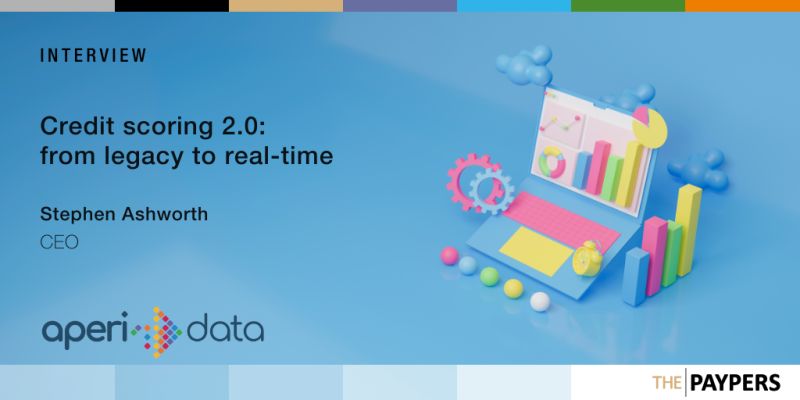Our CEO, Stephen Ashworth, recently sat down with The Paypers to discuss how we are revolutionsing the world of credit scoring through Open Banking, promoting financial inclusion and empowering lenders.
AperiScore™ will enable lenders to move beyond the boundaries of traditional Credit Bureau data, allowing them to score all applicants accurately in real time, including those with limited credit history or thin credit files.
We’re proud to be at the forefront of this exciting shift!
Story:
Please share with us the story of AperiData and the company’s mission.
AperiData was founded by risk practitioners turned serial entrepreneurs with more than 100 years of cumulated experience in global credit risk and data analytics. As innovators, we saw a need in society for fair and ethical assessment that could be achieved through Open Banking technology – that is because we saw significant limitations with legacy Credit Bureau data and traditional credit scoring methods, which are out of step with today’s digital economy and often overlook or totally exclude millions of consumers, especially those with thin or non-existent credit files.
Today, our real-time risk insights empower organisations to serve their customers digitally and work to improve life outcomes. This leads me to our mission: we are re-writing the rule book of the credit and risk industry. We are doing this by placing data with pinpoint accuracy instantaneously at the point of decision, enabling us to score the world ethically and fairly, promoting both financial inclusion and financial well-being for all.
This innovative approach replaces the need for often outdated credit data that may not fully capture a borrower’s financial health.
What role does Open Banking play in providing more accurate and real-time data for underserved populations? How does AperiScore differentiate itself from traditional credit scoring models?
Open Banking has transformed access to financial services for people who were previously underserved by giving lenders accurate, real-time data insights that reflect an individual’s actual financial behaviours. One in ten adults have no credit history and face significant challenges when it comes to accessing mainstream financial services like mortgages, loans or credit cards.
Therefore, using real-time bank data enables a step change in risk decisioning when compared with traditional scoring approaches. AperiData is effectively moving the world from batch to online, creating a whole new capability within the lending, credit scoring, and debt advice space. By connecting directly to a borrower’s bank account, with their consent, it offers lenders an up-to-the-minute snapshot of a borrower’s financial health. This real-time view allows for credit assessments based on day-to-day financial behaviours.
With 5.6 million credit-invisible adults in Britain, how does AperiData ensure that AperiScore effectively addresses the needs of this segment, and what early success stories can you share in improving acceptance rates?
I believe the proof is evidenced by those we’re currently working with. One existing lender used AperiData’s Open Banking risk insights which resulted in 9 in 10 marginal declines being overturned and approved. A bank account credit score was a natural extension of our existing product suite to support fairer credit decisions and drive financial inclusion by increasing approval rates, reducing defaults, and providing greater access to financial products for the underserved.
Through AperiScore™, we are empowering businesses to say ‘yes’ more and drive consumer trust by providing precise, real-time consumable data that is accessible and accurately reflects their financial truth. Importantly, it works to nurture an environment of increased choice based on trust for both businesses and consumers. It also enables a pathway for individuals to build their credit profiles within the system.
In a recent announcement, you mentioned that a lender using AperiData’s risk insights overturned 9 out of 10 marginal declines. Can you elaborate on how these insights integrate with lenders’ existing systems and contribute to better credit decisioning?
AperiData’s technology facilitates the seamless integration of real-time banking data into lenders’ existing credit decision-making processes and infrastructure.
By connecting to an applicant’s bank account, with their permission, lenders gain access to accurate, up-to-date insights into an individual’s financial behaviour, such as spending habits, income stability, and overall financial management.
By incorporating AperiData’s insights, it enables access to real-time information, which further enables more informed decisions. Rather than rejecting borrowers based on insufficient or outdated data, lenders can now assess each applicant’s financial health on current facts, leading to fairer outcomes and increased approval rates and opening access to a broader range of products.
How does AperiScore support financial inclusion, particularly for individuals with thin credit files, and what impact do you foresee it having on the broader lending and financial services landscape in the UK?
Again, it comes back to how the technology is enabling a fair and accurate snapshot of an individual’s financial history. Traditional credit scores may not capture the full picture of someone’s financial responsibility – particularly if they lack a robust credit history. AperiScore uses bank account transaction data to assess a borrower’s behaviour, capturing the reality of their spending and income patterns, rather than relying solely on historical data. This helps lenders include a broader range of applicants who might otherwise be excluded.
I believe we’ll see a huge impact; we already are with those we’re working with. Simon Lyons, Chief Strategy Officer at obconnect has said it perfectly to us: ‘the advent of a bank account-based credit score based solely on cashflow and cash position. This changes everything. This bank-based score can be aggregated with other sources to assess with a greater degree of accuracy than we ever thought.’
We believe this technology will become the standard, shifting the industry towards real-time assessments and reducing reliance on outdated models, ultimately improving credit access for all.
What are your plans for the future, and how do you envision expanding AperiScore findings to different sectors?
We’re only scratching the surface of our potential – but that’s not to downplay our achievements, such as 100% IP ownership, one of a few UK firms that are authorised by the FCA as an Open Banking provider and Credit Reference Agency (CRA).
We’ve already been able to take Citizens Advice Bureau (CAB) from three weeks to three minutes to give advice, which has then enabled us to deploy our solution to more of their branches across the UK in support of their debt advisory service. The ability for their users to instantly retrieve detailed, fully categorised income and expenditure breakdowns for their clients has been transformational. Where previously an intensive and often invasive manual information gathering was required, often taking weeks to build a picture of someone’s finances, this can now be provided immediately. This has a positive impact as not only is advice able to be given much sooner but it frees up time to advise many more clients.
Overall, we’re looking to expand across financial services, utilities, public sector, gambling, and legal sectors but any sector where financial insight can foster better consumer protection, responsible spending, and personalised services is where we know we can act as a key enabler.
With a continued commitment to financial transparency and inclusion, we’re continuing to innovate our solutions that empower users across diverse financial contexts, ultimately improving financial well-being across the UK.
About Stephen Ashworth
A financial services entrepreneur with 25 years of global experience in banking, risk, fraud, and payments. Before starting his own businesses, Steve was a senior leader in some of the world’s biggest financial institutions including Vice President of Risk Management at First Data and Head of Credit Risk Infrastructure and Data at Lloyds. Immediately prior to AperiData, Steve built a profitable GBP 3 million consultancy business in the regulated sector with his regular partner in all things credit and risk Andy Bonsall, COO at AperiData.
About AperiData
An industry challenger harnessing the power of Open Banking, AperiData is laser-focused on facilitating instant, accurate, and fair outcomes for consumers and financial institutions. Authorised and regulated by the Financial Conduct Authority as a Credit Reference Agency and Open Banking Provider the company is on a mission to improve financial inclusion by revolutionising credit scoring and lending processes. Founded by risk practitioners turned serial entrepreneurs with more than 100 years of experience in global credit risk and data analytics, AperiData’s real-time risk insights empower organisations to serve their customers digitally and work to improve life outcomes.
For more information, visit: www.AperiData.com




